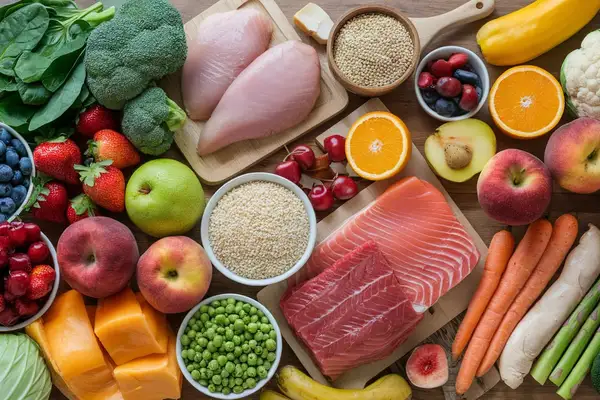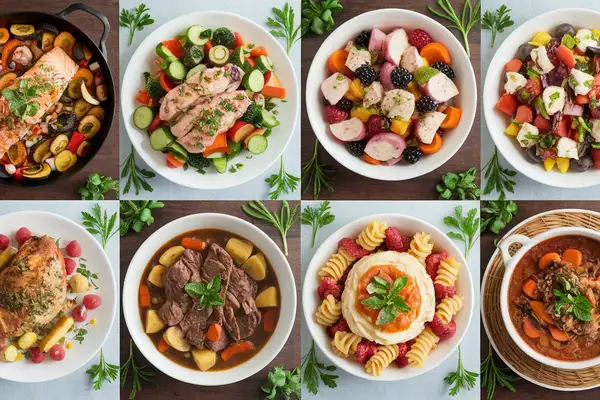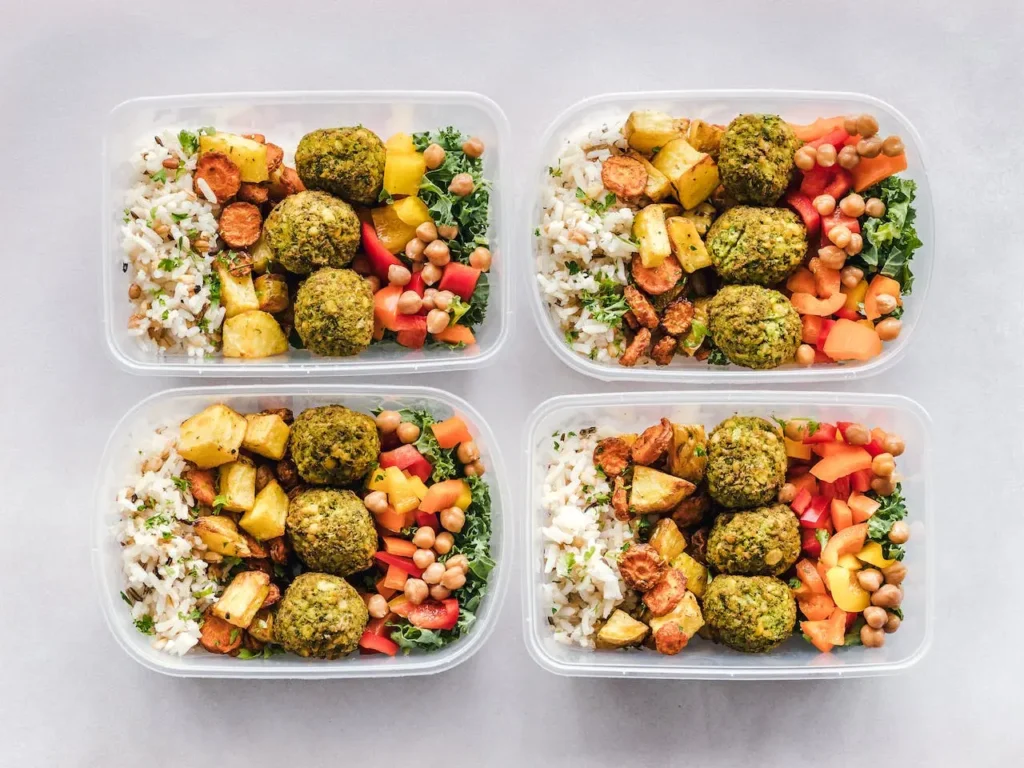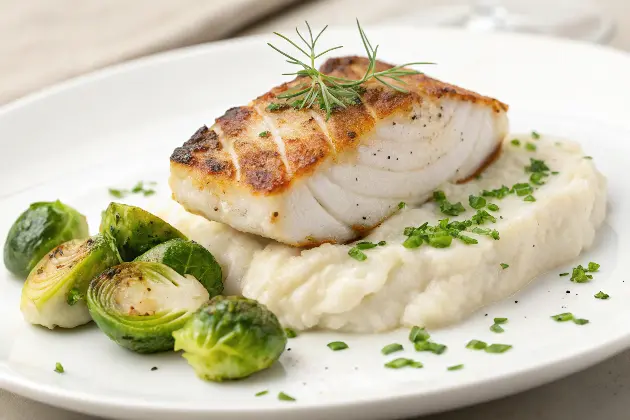Breastfeeding Diet Plan | Foods to Avoid While Breastfeeding

This post may contain affiliate links, meaning I may earn a commission if you make a purchase, at no extra cost to you. I only recommend products I trust. Thank you for your support.
Navigating motherhood, especially if you’re a new mom, comes with its set of joys and challenges, particularly when it comes to breastfeeding.
A thoughtfully planned breastfeeding diet not only fuels your body’s milk‑making machinery but also helps keep a gassy baby comfortable.
By prioritizing galactagogue‑rich staples like whole grains, flaxseeds, lean proteins, and lactation‑friendly herbs, you’ll support steady milk production while soothing your baby’s digestive system.
At the same time, steering clear of common irritants, such as cruciferous veggies, excess caffeine, and spicy or heavily processed foods, can minimize gas and fussiness.
This breastfeeding diet for gassy baby includes lactation friendly breastfeeding foods such as fennel, dill, mint, ginger, zucchini, carrots, spinach, and more to minimize gas and discomfort in little ones.
Additionally, this article highlights 17 foods to avoid while breastfeeding, essential for ensuring a happy and healthy postnatal journey for both you and your baby.
7-Day Breastfeeding Diet for Gassy Baby
This 7‑day breastfeeding meal plan is designed to support both robust milk production and gentle digestion for a gassy baby.
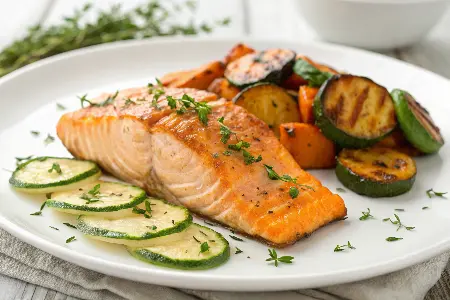
Day 1
Breakfast:
- Lactation oatmeal: Cook rolled oats with almond milk, stir in ground flaxseed and brewer’s yeast for milk‑boosting benefits. (½ cup rolled oats, 1 cup unsweetened almond milk, 1 tbsp ground flaxseed, 1 tbsp brewer’s yeast)
Lunch:
- Grilled chicken & carrot‑spinach salad: Grill chicken; toss with baby spinach, shredded carrots and a squeeze of lemon. (4 oz chicken breast, 2 cups baby spinach, ½ cup shredded carrots, lemon juice)
Dinner:
- Baked salmon with sweet potato & zucchini: Bake salmon with a drizzle of olive oil; roast sweet potato cubes and steam zucchini. (4 oz salmon, 1 small sweet potato, 1 cup zucchini, 1 tbsp olive oil)
Snacks:
- Rice cakes with almond butter: Spread almond butter on rice cakes. (2 rice cakes, 2 tbsp almond butter)
- Fennel tea & lactation cookie: Brew fennel tea; enjoy with one homemade oat‑based lactation cookie. (1 cup fennel tea, 1 cookie)

Day 2
Breakfast:
- Fenugreek chia pudding: Stir chia seeds and a pinch of ground fenugreek into almond milk; refrigerate overnight and top with raspberries. (3 tbsp chia seeds, 1 tsp ground fenugreek, 1 cup almond milk, ½ cup raspberries)
Lunch:
- Sprouted mung bean & vegetable salad: Toss sprouted mung beans with diced cucumber, grated carrot and chopped mint. (½ cup sprouted mung beans, ½ cup cucumber, ½ cup carrot, 1 tbsp chopped mint)
Dinner:
- Tilapia & apricot‑ginger glaze: Pan‑sear tilapia; brush with apricot preserve mixed with fresh ginger. Serve with steamed green beans. (4 oz tilapia, 1 tbsp apricot preserves, 1 tsp grated ginger, 1 cup green beans)
Snacks:
- Pear slices with cashew butter: Slice pear and serve with cashew butter. (1 medium pear, 1 tbsp cashew butter)
- Pumpkin seeds & dried apricots: Mix for a quick bite. (1 oz pumpkin seeds, 3 dried apricot halves)

Day 3
Breakfast:
- Green lactation smoothie: Blend spinach, banana, flaxseed and a scoop of Greek yogurt. (1 cup spinach, 1 banana, 1 tbsp ground flaxseed, ¼ cup Greek yogurt)
Lunch:
- Tuna‑cucumber rice bowl: Mix canned tuna with diced cucumber and dill; serve over brown rice. (4 oz tuna, ½ cup cucumber, 1 tbsp chopped dill, ½ cup cooked brown rice)
Dinner:
- Chicken & dill soup with rice: Simmer chicken broth with shredded chicken, rice and fresh dill. (4 oz shredded chicken, 1 cup low‑sodium broth, ½ cup cooked rice, 1 tbsp dill)
Snacks:
- Greek yogurt with oats: Stir quick oats into yogurt. (½ cup Greek yogurt, 2 tbsp quick oats)
- Roasted almonds: Lightly roast almonds for crunch. (1 oz almonds)
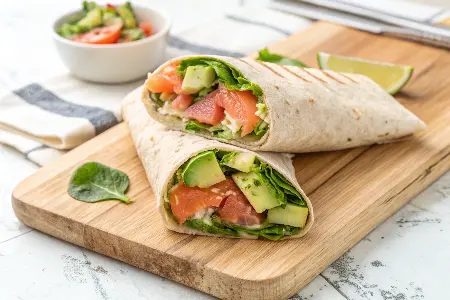
Day 4
Breakfast:
- Buckwheat lactation pancakes: Whisk buckwheat flour, egg, flaxseed and milk; cook on griddle and top with blueberries. (½ cup buckwheat flour, 1 egg, 1 tbsp ground flaxseed, ½ cup milk, ¼ cup blueberries)
Lunch:
- Salmon avocado wrap: Fill whole grain tortilla with flaked salmon, avocado slices and baby greens. (4 oz cooked salmon, ¼ avocado, 1 whole grain tortilla, handful baby greens)
Dinner:
- Beef & vegetable stir‑fry: Sauté lean beef strips with bell pepper, zucchini and ginger. (4 oz lean beef, ½ cup bell pepper, ½ cup zucchini, 1 tsp grated ginger)
Snacks:
- Banana with almond butter: Slice banana and top with almond butter. (1 small banana, 1 tbsp almond butter)
- Chamomile‑fennel tea: Brew to soothe digestion. (1 cup chamomile tea, ½ tsp crushed fennel seeds)

Day 5
Breakfast:
- Whole grain waffles with flax & strawberries: Top toasted waffles with ground flaxseed and sliced strawberries. (2 mini waffles, 1 tbsp ground flaxseed, ½ cup sliced strawberries)
Lunch:
- Turkey & roasted carrot wrap: Roast carrot strips; wrap with turkey slices and spinach in a whole grain tortilla. (3 oz turkey, ½ cup roasted carrots, handful spinach, 1 tortilla)
Dinner:
- Baked cod with mashed potato & green beans: Bake cod; serve with mashed potato (made with a splash of milk) and steamed green beans. (4 oz cod, ½ cup mashed potato, 1 cup green beans)
Snacks:
- Lactation oatmeal cookie: Home‑baked with oats and brewer’s yeast. (1 cookie)
- Cucumber sticks with hummus: Dip cucumber in hummus. (1 cup cucumber sticks, 2 tbsp hummus)

Day 6
Breakfast:
- Millet porridge with dates & almonds: Cook millet in water; top with chopped dates and slivered almonds. (½ cup millet, 1 cup water, 3 pitted dates, 1 tbsp almonds)
Lunch:
- Spinach & feta‑stuffed chicken: Butterfly chicken breast, fill with spinach and feta, bake until cooked through. (4 oz chicken breast, ¼ cup spinach, 2 tbsp feta)
Dinner:
- Shrimp & snow pea stir‑fry: Sauté shrimp with snow peas, carrots and garlic. (4 oz shrimp, ½ cup snow peas, ½ cup carrot, 1 clove garlic)
Snacks:
- Homemade trail mix: Combine pumpkin seeds, chopped almonds and dried cranberries. (½ oz each pumpkin seeds & almonds, 1 tbsp dried cranberries)
- Carrot sticks: Eat raw or lightly steamed. (1 cup carrot sticks)

Day 7
Breakfast:
- Egg & veggie scramble: Sauté zucchini and spinach; add beaten eggs and cook until set. (2 eggs, ½ cup zucchini, ½ cup spinach)
Lunch:
- Quinoa‑salmon patties: Mix cooked quinoa with flaked salmon, egg and dill; pan‑fry until golden. (½ cup quinoa, 3 oz salmon, 1 egg, 1 tbsp dill)
Dinner:
- Slow‑cooker chicken with pumpkin & dill: Combine chicken, pumpkin chunks, broth and dill; cook until tender. (4 oz chicken, 1 cup pumpkin, 1 cup low‑sodium broth, 1 tbsp dill)
Snacks:
- Date‑almond energy balls: Blend dates, almonds and flax; roll into balls. (3 dates, 1 oz almonds, 1 tbsp flaxseed)
- Greek yogurt with ground flaxseed: Stir flaxseed into yogurt. (½ cup Greek yogurt, 1 tbsp ground flaxseed)
Foods to Avoid While Breastfeeding
Here are 17 foods to avoid while breastfeeding. This list also includes gassy foods to avoid while breastfeeding that can cause gastrointestinal issues in babies.
1. Fish High in Mercury
Eating these fish during breastfeeding could lead to mercury being passed to your baby through breast milk, potentially affecting their health.
Mercury can harm your baby’s developing nervous system, leading to potential cognitive and developmental issues.
Here are examples of fish to avoid while breastfeeding:
- Shark
- Swordfish
- King Mackerel
- Tilefish (from the Gulf of Mexico)
- Marlin
- Orange Roughy
- Bigeye Tuna
2. Excessive Caffeine
Caffeine is a stimulant, and just like it can keep you awake, it can also affect your baby’s sleep. Infants have a limited ability to process caffeine because their metabolism is still developing.
For instance, reports have indicated that babies exposed to significant amounts of caffeine through breast milk may exhibit signs such as jitteriness, increased muscle tone, and restlessness.
In one case, a mother consuming around 4 to 5 cups of coffee daily noticed her 6-week-old baby showed trembling and increased irritability, which improved once she reduced her caffeine intake.
The NHS recommends that breastfeeding mothers limit caffeine intake to about 200 mg per day especially when the baby is still under 6 months old.
To put this into perspective, an average 8-ounce cup of coffee contains approximately 96 mg of caffeine, while black and green teas offer lower amounts.
Here are examples of caffeine to avoid while breastfeeding:
- Coffee
- Tea
- Chocolate
- Energy Drinks
3. Alcohol
When you consume alcohol, it’s important to understand that it transfers into your breast milk almost as readily as it enters your bloodstream.
This transfer means that the alcohol levels in your breast milk will closely mirror your blood alcohol levels.
Typically, the highest alcohol concentration in your milk occurs between 30 to 60 minutes after drinking, although eating food can delay this peak.
Alcohol can be transferred to your baby through breast milk and can affect their sleep and development.
If you choose to drink, wait at least two hours per drink before breastfeeding to minimize the alcohol content in your milk.
Consider pumping and storing milk beforehand if you plan to drink more than a minimal amount.
You should avoid this alcohol while breastfeeding:
- Wine
- Beer
- Spirits
- Cocktails
4. Certain Herbs
Herbs known as anti-galactagogues can reduce milk supply in large quantities or cause reactions in babies.
Additionally, herbs with stimulating properties can pass their stimulating effects to the baby, potentially leading to irritability and difficulty in sleeping.
Here are anti-galactagogues herbs to avoid while breastfeeding:
- Sage
- Parsley
- Oregano
- Lemon Balm
- Ginseng
- Ephedra
- St. John’s Wort
- Ma Huang
5. Excessive Garlic
Excessive garlic can change the flavor of your breast milk, making it stronger and potentially off-putting to some babies. This change is usually noticeable within 1 to 3.5 hours after you’ve eaten garlic.
The response of babies to garlicky breast milk varies. While some infants seem to enjoy the new flavors, spending more time feeding and showing increased sucking, others might react differently.
Interestingly, this doesn’t just affect the sensory experience for your baby; it could also influence their future food preferences.
Some research suggests that infants exposed to a variety of tastes through breast milk, including garlic, might become less picky eaters as they grow.
If you notice your baby is unusually fussy after you consume garlic, it might be helpful to eliminate garlic from your diet temporarily to see if there’s an improvement in their comfort and feeding patterns.
Avoid excessive consumption of these garlic foods while breastfeeding:
- Garlic Cloves
- Garlic Powder
- Garlic Bread
- Garlic-Infused Oils
6. Dairy Products
Cow’s milk is among the foods to avoid while breastfeeding. This protein is a common trigger for food sensitivities in infants, which might surprise you.
If your little one is experiencing symptoms like colic like discomfort, excessive crying, or irritability, it could be a reaction to dairy products in your diet.
Other signs to watch for include skin reactions such as eczema, digestive issues like diarrhea (sometimes with blood), vomiting, and respiratory symptoms like wheezing or a stuffy nose.
If you find that dairy products are indeed causing issues for your baby, don’t worry; there are plenty of nutritious alternatives that can help you maintain a balanced diet while breastfeeding.
These are examples of dairy products to avoid while breastfeeding:
- Milk
- Cheese
- Yogurt
- Butter
7. Nuts
Nut allergies can be severe and may affect your baby if there is a family history of allergies. Symptoms of a nut allergy in your baby can include rash, hives, and difficulty breathing.
Here are examples of nuts to avoid while breastfeeding:
- Peanuts
- Hazelnuts
8. Chocolate
When considering chocolate consumption while breastfeeding, it’s important to understand that chocolate contains caffeine and a closely related compound called theobromine.
The levels of theobromine vary depending on the type of chocolate. Overconsumption of chocolate can affect your baby and lead to irritability and sleep disturbances.
It is advisable to avoid certain chocolates while breastfeeding or in moderation and watch for any signs of sensitivity in your baby.
Here are some chocolates to avoid while breastfeeding:
- Dark Chocolate
- Milk Chocolate
- Chocolate Bars
- Hot Chocolate
9. Citrus Fruits
Citrus fruits are high in vitamin C but can be acidic and irritating to your baby’s digestive system. Some babies might experience diaper rash, fussiness, or increased spit-up.
If you notice these symptoms, try reducing your intake of citrus fruits and juices.
Consider avoiding these citrus fruits while breastfeeding:
- Oranges
- Lemons
- Grapefruits
- Limes
10. Wheat
Gluten intolerance or sensitivity can cause gastrointestinal distress in some breastfed babies, such as diarrhea, gas, or fussiness.
If you suspect a sensitivity, try eliminating wheat from your diet to see if symptoms improve.
- Bread
- Pasta
- Cereals
- Baked Goods
11. Eggs
Eggs are a common allergen and can cause reactions in some breastfed babies. Symptoms of an egg allergy can include skin rashes, hives, or gastrointestinal issues.
If you suspect an egg allergy, try removing eggs from your diet and observe any changes in your baby’s condition.
Examples include:
- Boiled Eggs
- Scrambled Eggs
- Omelets
- Egg Salad
12. Soy
Soy proteins can pass through breast milk and lead to allergic reactions such as rash, wheezing, or gastrointestinal problems.
Consider avoiding these soy products while breastfeeding if your baby shows signs of sensitivity:
- Soy Milk
- Soy Sauce
- Tofu
- Edamame
13. Corn
Corn and corn products can sometimes cause allergic reactions or sensitivities in babies. Symptoms can include fussiness, gassiness, and digestive issues.
If you suspect corn might be causing problems for your baby, try eliminating these corn foods from your diet to see if symptoms improve:
- Corn on the Cob
- Corn Chips
- Cornbread
- Popcorn
14. Cruciferous Vegetables
Cruciferous vegetables can cause gas and discomfort in some babies. While these vegetables are nutritious, their gas-producing properties might lead to fussiness and bloating.
Examples of cruciferous vegetables to avoid while breastfeeding include:
- Broccoli
- Cauliflower
- Cabbage
- Brussels Sprouts
15. Processed Foods
Processed foods often contain additives, preservatives, and artificial flavors that can be passed to your baby through breast milk.
These foods are usually low in essential nutrients and high in unhealthy fats, sugars, and salt. Focus on a low-sodium diet, or whole, unprocessed foods to ensure you and your baby receive optimal nutrition.
Processed foods with high sodium and preservatives can affect the taste of breast milk and potentially cause digestive issues in the baby.
Here are some of the processed foods to avoid while breastfeeding:
- Fast food
- Packaged snacks
- Ready to eat meals with high sodium and preservatives
16. High Sugar Foods
Excessive sugar can lead to a temporary spike in energy followed by a crash, affecting the mother’s energy levels and potentially the baby’s sleep patterns.
High-sugar foods to avoid while breastfeeding include:
- Candy
- Sugary snacks
- Desserts with high sugar content
17. Spicy Foods
While there’s no evidence that spicy foods should be avoided while breastfeeding, it’s important to observe how your baby reacts after you consume these foods.
Despite these findings, every baby is different. Some might be sensitive to specific spices or ingredients that come through in the breast milk.
After consuming spicy foods, watch for any changes in your baby’s behavior or signs of discomfort such as fussiness, rashes, or digestive issues.
Here are some of the spicy foods to avoid while breastfeeding:
- Hot peppers
- Spicy curries
- Dishes with hot sauces
Friendly Breastfeeding Foods
These breastfeeding foods help boost milk supply, nourish mom, and keep baby’s digestion calm and comfortable:
1. Healthy Fats
- Avocado
- Almonds
- Walnuts
- Cashews
- Seeds (flaxseeds, chia seeds)
- Olive oil
- Fatty fish (salmon)
2. Protein-Rich Foods
- Chicken
- Turkey
- Lentils
3. Whole Grains
- Brown rice
- Quinoa
- Oats
- Whole grain bread
- Barley
4. Plant-based Dairy Products
- Unsweetened almond milk
- Oat milk
- Coconut milk
- Cashew cheese
5. Fruits and Vegetables
- Blueberries
- Spinach
- Sweet potatoes
- Bell peppers
- Strawberries
- Cantaloupe
- Bananas
- Mangoes
6. Omega-3 Fatty Acids
- Flaxseeds
- Chia seeds
- Fatty fish (salmon, trout)
- Hemp seeds
7. Lactogenic Foods
- Oats
- Barley
- Fenugreek
- Brewer’s yeast
- Fennel seeds
8. Iron-rich Foods
- Lean red meat (beef, lamb)
- Lentils
- Spinach
- Fortified cereals
9. Safer Fish Alternatives
- Salmon
- Tilapia
- Cod
- Catfish
- Pollock
- Herring
- Light Canned Tuna
10. Hydration
- Water
- Herbal teas (chamomile, ginger)
- Clear soups
- Coconut water
- Fruit-infused water
Resources
- https://www.ncbi.nlm.nih.gov/books/NBK501467
- https://www.ncbi.nlm.nih.gov/pmc/articles/PMC5383635/
- https://www.drjaygordon.com/blog-detail/ginseng-is-it-safe-for-nursing-mothers
- https://pubmed.ncbi.nlm.nih.gov/32519536/
Conclusion
Navigating the journey of breastfeeding as a new mom, we’ve uncovered 17 foods to avoid while breastfeeding to ensure the well-being of both you and your baby.
From the gassy foods to avoid while breastfeeding to what to eat while breastfeeding to increase baby weight, each piece of advice serves as a beacon, guiding you through the maze of dietary choices.
Furthermore, making conscious decisions about what to eat while breastfeeding to increase baby weight can contribute to the healthy growth and development of the breastfeeding baby.
Remember, every baby is different, and what affects one might not affect another. Pay close attention to your baby’s reactions and consult with your pediatrician if you have any concerns.
Breastfeeding is a special time, and with the right dietary choices by understanding the foods to avoid while breastfeeding, you can make it a positive experience for both you and your baby.
- 7-day meal plan for gestational diabetes
- 50 soft foods to eat after dental surgery
- 7 day meal plan for cancer patients
- Foods to avoid with a pituitary tumor
- How to get rid of PCOS belly fat quickly
- Tips for hiring a nanny
- Best infant care daycare center
- 6 week plan Ozempic weight loss results
- Best childcare centers
- Can dogs eat corn
- 5-day menopause diet plan to lose weight
- Caregiver duties and responsibilities
- 7 day meal plan for low potassium diet
- 3000 calorie meal plan
- 7-day elimination diet meal plan
- 7-day PCOS diet plan for weight loss
FAQs
What are gassy foods to avoid while breastfeeding?
Gassy foods to avoid while breastfeeding include beans, broccoli, cabbage, onions, and spicy foods, as they can cause gas in both the mother and the baby when consumed in large quantities.
How long do gassy food effects last in breastfed babies?
The effects of gassy foods on breastfed babies can vary. In most cases, symptoms may appear within a few hours of consumption and subside within 24-48 hours.
Is it necessary to avoid spicy foods while breastfeeding?
For some babies, spicy foods consumed by the mother can cause discomfort. It’s advisable to be cautious with spicy foods and observe the baby’s reaction to determine if they should be limited or avoided.
Are there specific vegetables that should be avoided during breastfeeding?
Breastfeeding mothers might want to avoid certain vegetables that could cause gas and discomfort for both mother and baby such as broccoli, cabbage, and Brussels sprouts.
